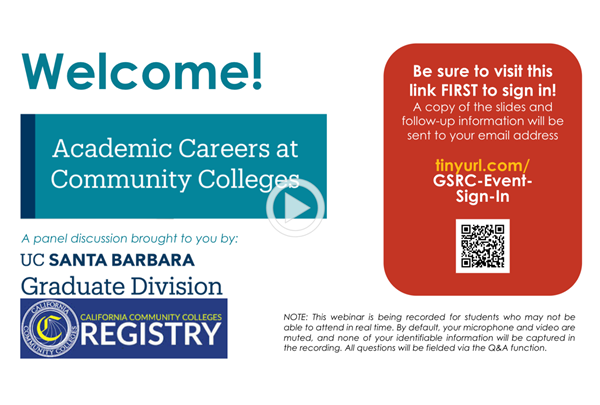Career & Tools
To learn more about the academic culture and teaching opportunities at community colleges, the Graduate Division recently hosted a discussion with community college professors and professionals. These experts discussed the range of opportunities these schools offer. Read on to access a recording of the panel and some frequently asked questions.
As part of your academic job search, have you thought about a career at a community college? Consider the following:
- There are currently more than 1,200 two-year institutions in the United States, which makes them a good option for individuals with geographical constraints
- Community colleges presently account for over 40% of higher education in the United States
- Most two-year colleges are eager to attract highly qualified PhDs
To learn more about the academic culture and teaching opportunities at community colleges, the Graduate Division recently hosted a discussion with a virtual panel of community college professors and professionals. These experts discussed the range of opportunities these schools offer.
To access the recording of the online webinar click here.

Additionally, here's a copy of the Q&A âfrom the âpanel that may be helpful in your exploration of academic careers at community colleges:
Q: For teaching mathematics part time, is an M.Ed, CA Single-Subject Teaching Credential in Math (for high school mathematics), and a Bachelors degree in mathematics enough?
A: âIt is a local decision. I would recommend you contact HR for the college you are interested in teaching part time.
Q: What advice do you have for interdisciplinary applicants?
A: Focus on the job description and the preferred qualifications and how you meet those.
Q: Can you explain a bit more about the rubric system you use to evaluate performance for interviewees? Is this fairly standard, or does it vary from school to school, department to department?
A: It would vary from school to school and department to department.
Q: If there are 2 faculty positions open within a department that you are qualified for, would it be possible to considered for both positions even if you have only applied to 1? Or are you limited to only those positions that you apply to directly? I know some post-docs will suggest applying to other positions based on fit within an institution, but I am not sure if this occurs within the formal faculty hiring process.
A: That would be a good question to contact HR at the college you are applying to.
Q: How many letters of recommendations are typically required when applying? Are letters from students also required?
A: It will depend on the college. Typically 2-3 and sometimes student evaluations will count.
Q: Do you usually teach the same classes repeatedly or does it vary a lot?
A: It depends on the department. I like to vary and work in a department where I can do that. Sometimes, there are seniority rules though.
Q: How many tenure track positions are typically offered each year within a department? Or does it vary widely from year to year?
A: This will vary from year to year and depends on the college/district and their needs.
Q: Do tenure track faculty teach throughout the summer months as well? What are summer requirements like in general?
A: It depends on the collective bargaining unit language. Most teaching faculty have 10 month contracts so summer is off. Counseling or library faculty could have 11 or 12 month contracts.
Q: Are there opportunities for cc professors to do research? Or is this rarely expected?
A: Rarely expected. But is welcomed though. Grant funding would be needed.
Q: What the main component of evaluation for tenure? Student evaluations? Committee evals?
A: Committee evaluations and improvement of teaching and demonstrating commitment to improving student learning.
Q: I would love to live in my hometown and teach at the wonderful Community College I attended. Is adjuncting for the Community College you hope to teach for a good way to get your foot in the door, or a fool's-errand?
A: It depends. I have seen it work out well and other times not work out well. Relationships are important and note that the hiring committee is to evaluate on what is submitted and what they hear during the interview. They are not to bring in "outside" information (outside the interview process).
Q: How common/easy is it to transition into administration positions and how widely do the duties and salaries vary?
A: I have seen this happen fairly well. Salaries vary - these should also be on the HR website.
Q: Submitting a resume rather than a CV?
A: Either works.